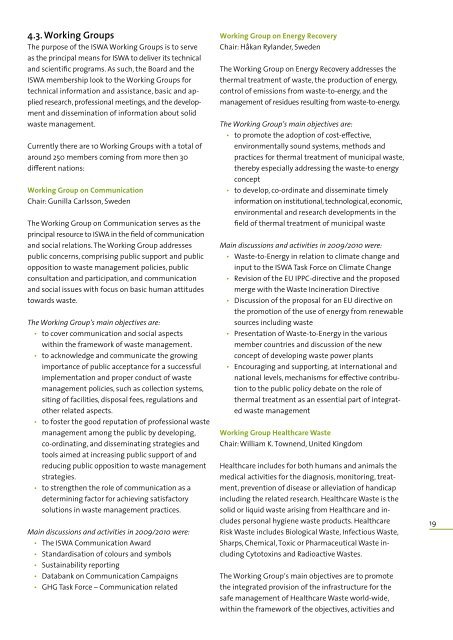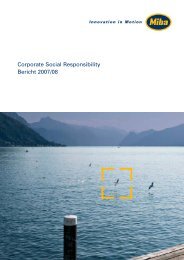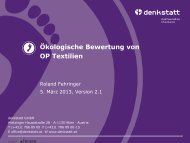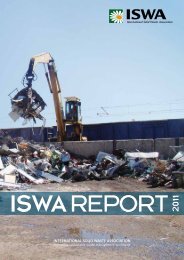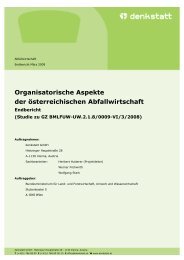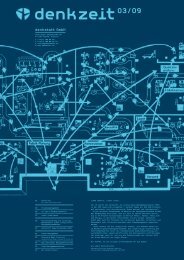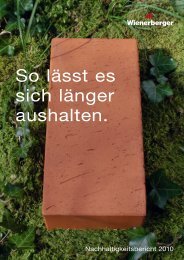INTERNATIONAL SOLID WASTE ASSOCIATION - Denkstatt
INTERNATIONAL SOLID WASTE ASSOCIATION - Denkstatt
INTERNATIONAL SOLID WASTE ASSOCIATION - Denkstatt
You also want an ePaper? Increase the reach of your titles
YUMPU automatically turns print PDFs into web optimized ePapers that Google loves.
4.3. Working Groups<br />
The purpose of the ISWA Working Groups is to serve<br />
as the principal means for ISWA to deliver its technical<br />
and scientific programs. As such, the Board and the<br />
ISWA membership look to the Working Groups for<br />
technical information and assistance, basic and applied<br />
research, professional meetings, and the development<br />
and dissemination of information about solid<br />
waste management.<br />
Currently there are 10 Working Groups with a total of<br />
around 250 members coming from more then 30<br />
different nations:<br />
Working Group on Communication<br />
Chair: Gunilla Carlsson, Sweden<br />
The Working Group on Communication serves as the<br />
principal resource to ISWA in the field of communication<br />
and social relations. The Working Group addresses<br />
public concerns, comprising public support and public<br />
opposition to waste management policies, public<br />
consultation and participation, and communication<br />
and social issues with focus on basic human attitudes<br />
towards waste.<br />
The Working Group‘s main objectives are:<br />
• to cover communication and social aspects<br />
within the framework of waste management.<br />
• to acknowledge and communicate the growing<br />
importance of public acceptance for a successful<br />
implementation and proper conduct of waste<br />
management policies, such as collection systems,<br />
siting of facilities, disposal fees, regulations and<br />
other related aspects.<br />
• to foster the good reputation of professional waste<br />
management among the public by developing,<br />
co-ordinating, and disseminating strategies and<br />
tools aimed at increasing public support of and<br />
reducing public opposition to waste management<br />
strategies.<br />
• to strengthen the role of communication as a<br />
determining factor for achieving satisfactory<br />
solutions in waste management practices.<br />
Main discussions and activities in 2009/2010 were:<br />
• The ISWA Communication Award<br />
• Standardisation of colours and symbols<br />
• Sustainability reporting<br />
• Databank on Communication Campaigns<br />
• GHG Task Force – Communication related<br />
Working Group on Energy Recovery<br />
Chair: Håkan Rylander, Sweden<br />
The Working Group on Energy Recovery addresses the<br />
thermal treatment of waste, the production of energy,<br />
control of emissions from waste-to-energy, and the<br />
management of residues resulting from waste-to-energy.<br />
The Working Group’s main objectives are:<br />
• to promote the adoption of cost-effective,<br />
environmentally sound systems, methods and<br />
practices for thermal treatment of municipal waste,<br />
thereby especially addressing the waste-to energy<br />
concept<br />
• to develop, co-ordinate and disseminate timely<br />
information on institutional, technological, economic,<br />
environmental and research developments in the<br />
field of thermal treatment of municipal waste<br />
Main discussions and activities in 2009/2010 were:<br />
• Waste-to-Energy in relation to climate change and<br />
input to the ISWA Task Force on Climate Change<br />
• Revision of the EU IPPC-directive and the proposed<br />
merge with the Waste Incineration Directive<br />
• Discussion of the proposal for an EU directive on<br />
the promotion of the use of energy from renewable<br />
sources including waste<br />
• Presentation of Waste-to-Energy in the various<br />
member countries and discussion of the new<br />
concept of developing waste power plants<br />
• Encouraging and supporting, at international and<br />
national levels, mechanisms for effective contribution<br />
to the public policy debate on the role of<br />
thermal treatment as an essential part of integrated<br />
waste management<br />
Working Group Healthcare Waste<br />
Chair: William K. Townend, United Kingdom<br />
Healthcare includes for both humans and animals the<br />
medical activities for the diagnosis, monitoring, treatment,<br />
prevention of disease or alleviation of handicap<br />
including the related research. Healthcare Waste is the<br />
solid or liquid waste arising from Healthcare and includes<br />
personal hygiene waste products. Healthcare<br />
Risk Waste includes Biological Waste, Infectious Waste,<br />
Sharps, Chemical, Toxic or Pharmaceutical Waste including<br />
Cytotoxins and Radioactive Wastes.<br />
The Working Group‘s main objectives are to promote<br />
the integrated provision of the infrastructure for the<br />
safe management of Healthcare Waste world-wide,<br />
within the framework of the objectives, activities and<br />
19


